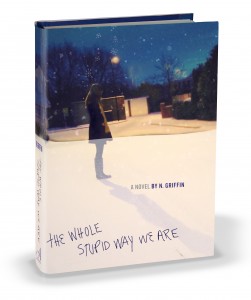Hello!
In case you were wondering, this is not going to morph into a blog composed exclusively of me interviewing other authors. But I sure like doing said interviews, and I am now pleased to present another one!
I was intrigued by N. Griffin’s debut novel, The Whole Stupid Way We Are, from the moment I heard its excellent title. It’s about Dinah, church choir director’s daughter who sings off-key, and Skint, who walks coatless through brutal cold; about their friendship and the things that divide them. For a book whose characters have some very hard-to-deal-with experiences, it’s surprisingly funny, and the prose is always precise, whether evoking an escape from detention, the play of sunlight on a toddler’s feet, or how it feels when your help can’t fix what you want to fix.
So I asked N. Griffin some questions. I’ve tried to avoid spoilers, but if you are extremely concerned about such things you might want to wait to look at this interview until you’ve finished reading the book. Which, in case it wasn’t obvious from the above, I recommend that you do.
SR: I love the names in TWSWWA. How do you choose character names?
NG: Thank you! Naming the characters is one of the most fun parts about writing books, I think. For TWSWWA, Dinah’s name came first. When I was just starting to write the book, I was working with a woman whose name I adored. Let’s call her Mynah Deech. I loved saying “Mynah Deech†so much I worked it into conversation at every opportunity—“What do you think Mynah Deech would think of this?†and “We better check with Mynah Deech!â€Â In fact, I wanted to steal her whole name for my book but I thought that would be too weird so I settled for a name that rhymed with it and came up with Dinah Beach.  All of the other names just felt right to me, and some of the names are sort of a broken-up, messed-up version of a word that was central to my heart while I was writing the book. A MYSTERY! :)
SR: I was struck by Skint’s angry passion about social issues far removed from the considerable challenges of his day-to-day life. At what point in the writing process did that aspect of his character become clear to you?
NG: It was always clear to me; one of the first things I knew about Skint was this. I think this aspect of his character came from two places for me—first, I know so many kids who care this much about suffering and the world, and we never seem to pay attention to that aspect of teenagers. We prefer to think they are only and entirely self-centered, and I know that is beyond not true. I also knew that Skint’s passion for this was an outlet for all the anger in his life—he can’t express what is going on at home, but he can get riled up about the world in a public way, and all his personal hurt and upset gets added to his natural compassion and comes out with all the intensity that would suggest.
SR: Dinah genuinely cares about Skint, but also seems to see him as a project or a job. She comes up with strategies to distract & cheer him: “Outings, she thought firmly, and good ideas to think about. Pretending, talismans, things to do with trees.” I think many of us have known and/or been Dinahs. What do you think drives that particular intense need to help people who may or may not benefit from our efforts?
NG: For Dinah, I think it’s the same intense love and compassion as Skint has, only hers is focused on the personal and her own aching for Skint. I also think she truly thinks she’s helping him, and that can be an intoxicating feeling—who doesn’t want to feel like they are needed like that? But the balance is off for sure, and I think that’s something lots of people take years to make sense of. Not that I know anything about that. No sirree. ;)
SR: I hope I can say this without giving too much away: I was impressed that you leave certain things unresolved at the end. Did you always know you wanted to give that shape to the story, or did you have previous drafts that went in other directions?
NG: Nope, that was always how it was. I think I wrote the last scene when I was only a third of the way through the first of my million drafts. For me, the arc of the story is that of their friendship, not of their whole entire lives. And when that arc was complete, so was the book.
SR: And finally: Dinah and Skint regularly embark on “Fantastic or Excruciating?” adventures:
“An FoE is an entertainment where you can’t tell beforehand whether it will be fabulous and surreal or only just a misery-making fiasco that will make you ache for the performers involved because it is all so awful and the performers are unaware. Or maybe they are aware. And then it is even worse.”
Have you ever done this yourself, and if so, can you describe one?
NG: Oh, my lordie, yes, all the time and even still! Every single FoE in the book except for Walter is one that I have actually experienced. There are so many more, too! I would adore to hear about other people’s FoE’s. I live for this kind of thing.
SR: Thanks for answering, NG!Â

